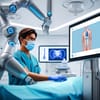Artificial intelligence (AI) is transforming the field of surgery, enhancing precision, reducing risks, and improving patient outcomes. By providing real-time imaging and analytics, AI-powered systems enable surgeons to make more accurate diagnoses and treatments. Robotic-assisted surgery, such as the Da Vinci Surgical System, assists surgeons with complex procedures, reducing hand tremors and enabling minimally invasive surgeries.
AI algorithms also analyze patient data to predict potential complications, allowing surgeons to take proactive measures. Additionally, AI helps create customized treatment plans based on a patient's genetics, lifestyle, and medical history. This personalized approach to medicine enables surgeons to tailor their treatments to individual patients, leading to better outcomes.
The integration of AI in surgery also streamlines surgical processes. AI-powered virtual reality (VR) allows trainees to practice complex cases in a safe environment, while AI analyzes upcoming surgical schedules to generate customized setup instructions, optimizing instrument usage and reducing waste.
As AI continues to evolve, it will likely play an increasingly important role in shaping the future of surgery. Rather than replacing surgeons, AI will augment their abilities, providing unparalleled precision and data-driven insights. The collaboration between humans and AI will enable more precise, efficient, and personalized care, ultimately leading to better patient outcomes.
The future of surgery is being shaped by the integration of AI, and it's exciting to think about the potential benefits that this technology could bring. With AI, surgeons can focus on what matters most – providing the best possible care for their patients.


